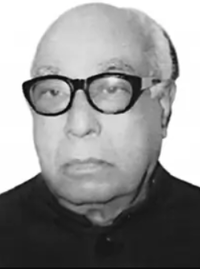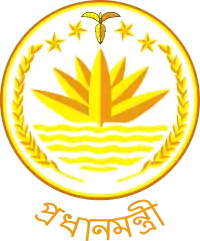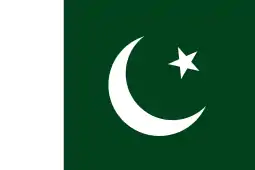Ataur Rahman Khan
Ataur Rahman Khan (Bengali: আতাউর রহমান খান; 6 March 1905 – 7 December 1991) was a Bangladeshi lawyer, politician and writer, and served as Chief Minister of East Pakistan from 1 September 1956 – March 1958, and as the Prime Minister of Bangladesh from 30 March 1984 to 9 July 1986.[1] He is noted for being the only Bangladeshi to have served as premier in both pre and post independent Bangladesh
Ataur Rahman Khan | |
|---|---|
আতাউর রহমান খান | |
 | |
| 5th Prime Minister of Bangladesh | |
| In office 30 March 1984 – 9 July 1986 | |
| President | Hossain Mohammad Ershad |
| Preceded by | Shah Azizur Rahman |
| Succeeded by | Mizanur Rahman Chowdhury |
| 5th Chief Minister of East Bengal | |
| In office 1 September 1956 – March 1958 | |
| Governor | Amiruddin Ahmad |
| Preceded by | Abu Hussain Sarkar |
| Succeeded by | Abu Hussain Sarkar |
| Personal details | |
| Born | 6 March 1905 Balia, Bengal Presidency, British India (now Dhaka, Bangladesh) |
| Died | 7 December 1991 (aged 86) Dhaka, Bangladesh |
| Political party | Jatiya Party (1984–1991) |
| Other political affiliations | All-India Muslim League (Before 1949) Awami League (1949–1984) |
| Alma mater | Jagannath University University of Dhaka |
Early life
Ataur Rahman Khan was born in 1905 at Balia village in Dhamrai thana of Dhaka district. He passed his matriculation examination from Pogose School in Dhaka in 1924, FA examination from Jagannath College in 1927, and obtained BA (Hons) degree from the Dhaka University in 1930.
Having obtained his B.L degree in 1936 from the Dhaka University he joined the Dhaka district bar in 1937. Ataur Rahman Khan joined the judicial service as a munseef in 1942, but after two years he left the job to return to the bar (1944).
Activism and politics
Ataur Rahman Khan began his career in politics as an activist of the Krishak Praja Samiti. He was secretary of the Dhaka district unit of the party in 1934-35 AD. He joined the muslim league in 1944, and was a member of the Dhaka district working committee and vice president of the Manikganj sub-divisional unit committee of the party. Ataur Rahman played a substantial role in floating the Awami Muslim League, later the Awami League (1949), and was the vice president of the party since its inception till 1964.
As a member of the Sarbadaliya Rastrabhasa Karmaparisad (30 January 1952) he played a vital role in piloting the Bangladesh Language Movement, and was later elected convenor of the reconstituted working committee in March 1952.
Ataur Rahman Khan was the joint convenor (1953-1955) of the united front formed for contesting the 1954 general elections. He was elected a member of the East Bengal Legislative Assembly as a nominee of the Front. He was a member of the provincial cabinet of Sher-e-Bangla Fazlul Huq in charge of the Ministry of Civil Supplies (1954). He was elected a member of the Pakistan Constituent Assembly in 1955. He was simultaneously the leader of the opposition parliamentary party in the provincial assembly (1955-56) and the deputy leader of the opposition parliamentary party in the constituent assembly.
Chief Minister of East Pakistan
Ataur Rahman Khan became the Chief Minister of East Pakistan in September 1956 and continued to hold this position till the promulgation of martial law in the country in 1958. Father of the Nation Bangabandhu Sheikh Mujibur Rahman was a minister in this cabinet. In 1960, EBDO was imposed upon him by the military government. As one of the leaders of the National Democratic Front (NDF) formed under the leadership of Huseyn Shaheed Suhrawardy in 1962 he played a vital role in the movement for the restoration of democracy in the country. He was elected president of the Dhaka High Court Bar Association in 1969 and a member of the Bar Council in 1970. Ataur Rahman Khan floated a new political party styled as Jatiya League in 1969, and was elected its president. He contested in the National Assembly election in 1970, but was defeated.
Liberation War and Bangladesh
During the war of liberation in 1971 Ataur Rahman Khan was arrested by the Pakistan occupation army, and was however released in September after confinement for five months. Ataur Rahman was elected a member of the Jatiya Sangsad in 1973. He joined the Bangladesh Krishak-Sramik Awami League (BAKSAL) in 1975, and was made a member of its central committee. After the fall of BAKSAL Ataur Rahman revived his party Jatiya League in 1976. He was elected a member of the Jatiya Sangsad in 1979. Under his leadership the Jatiya League as a member of the seven party alliance took active part in the movement against the military rule of General Hussein Muhammad Ershad.
Prime Minister of Bangladesh
He eventually joined the cabinet of General Ershad with the belief that by being part of the government he would be able to direct it towards a more democratic agenda. He was made the Prime Minister in 1984 which office he held till 1 January 1985, when he resigned citing irreconcilable differences with General Ershad's style of administration.
Bibliography
Ataur Rahman Khan has authored a number of books most noted of which are Ojarotir Dui Bochhor (1963), Shoiracharer Dosh Bochhor (1969), Prodhan-Montritter Noi Maash (1987), and Oboruddhor Noi Maash (1990).
Death
Ataur Rahman Khan died in Dhaka on 7 December 1991 at the age of 86 and is buried beside Parliament.
References
- Khan, Muazzam Hussain (2012). "Khan, Ataur Rahman". In Islam, Sirajul; Jamal, Ahmed A. (eds.). Banglapedia: National Encyclopedia of Bangladesh (Second ed.). Asiatic Society of Bangladesh.
| Political offices | ||
|---|---|---|
| Preceded by Shah Azizur Rahman |
Prime Minister of Bangladesh 1984–1986 |
Succeeded by Mizanur Rahman Chowdhury |
| Diplomatic posts | ||
| Preceded by New Office |
Chairperson of SAARC 1985 |
Succeeded by Rajiv Gandhi |


